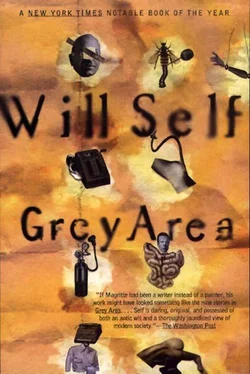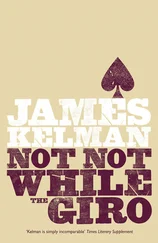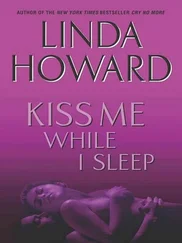‘You know, Peter-Donald, the shot is spattering against the windows of the house, I think it’s making the children feel a little anxious.’
‘Awfully sorry, but the fog’s so damn thick today. Wouldn’t have come out at all but I got delivery of these yesterday, so we thought we’d give them a try.’ He held out his wrist, to which was strapped a miniature radar screen. ‘They could make all the difference to the shooting around here.’
Simon-Arthur looked from his landlord’s masked face to the black LCD of the mini-radar screen. If there was any trace of irony, or even self-awareness, in Peter-Donald’s voice it was effectively destroyed by the throat mike, and his expression was, of course, completely hidden.
A thread of white luminescence circled the screen. When it sped past a certain region there were splutters of light.
‘Are those the birds?’ he asked, pointing towards the fading gleams.
‘Ya, that’s right. Charlie-Bob has rigged them all up with little radar cones. Mind you’ — he barked a laugh, which the throat mike transmitted as a howl — ‘I don’t think you could put ’em on grouse. Poor buggers would be dwarfed by the things!’
There was a scatter of microphonic squawks from the other guns — they were obviously getting restive. ‘Well, if you’ll excuse me, old boy,’ said Peter-Donald, cocking his gun, ‘I’ll get this drive started and then we’ll be off your property, eh?’
Despite the warning painful catch in his throat Simon-Arthur stood his ground, interested to see what would happen. The guns formed up again into a ragged line. Even in the short time he and Peter-Donald had been chatting, the fog had grown denser. Now, not only were the beaters no longer within sight, but the trees themselves were little more than shadows.
Peter-Donald took a wafer-thin cellular phone from the pocket of his jacket and punched one of the buttons on its console. ‘I think we’re ready now, Charliekins,’ he barked, the mouthpiece pressed against his throat mike. ‘D’you want to start the drive?’
There was a ragged chorus of shouts and ‘Halloos!’, together with the sound of stout sticks being smote against the underbrush. Then there was a warbling, almost grunting noise, and ten or fifteen pheasants came staggering out of the bank of fog. They had radar cones tied around their necks. These were silvery-grey rhomboids, at least four times bigger than the birds’ heads. The effect was ridiculous and pathetically unnatural: the birds — who Simon-Arthur knew found it hard to fly anyway when the fog was thick — were still further handicapped by this new sporting technology. Only two or three of them could get airborne at all, and then only for a couple of wing beats. The rest just zigzagged in a loose pack across the traverse of the guns, the sharp corners of the radar cones banging first into their eyes and then their soft throats.
There were a few scattered shots — none of which appeared to find a mark. Most of the guns held their fire.
‘Not much sport in this, is there?’ said Simon-Arthur sarcastically, and then realised with a shock that he had spoken audibly. He had been out in the fog for so long that he had begun to assume that he must be wearing a muffling mask.
But this didn’t seem to offend Peter-Donald. He was striding towards the fence, and signalling to the other guns to follow. He turned on his heel for a moment, facing back towards Simon-Arthur, and publicly-addressed him. ‘It is, if we let them get into the fog bank. D’ye see? Then we’ve got a shoot entirely on instrumentation’ — he indicated the wristscreen — ‘now that’s real sport!’ Then he swivelled round and marched off.
The birds had managed to reach the fence and stagger over or under it. Then they were enveloped by the fog. The guns followed them, and finally trailing behind came the donkey-jacketed figures of the beaters, who also disappeared, still hallooing. Simon-Arthur noticed that most of them weren’t even wearing chemical masks.
Simon-Arthur stood for a moment, and then turned towards the house. But when he reached the front door, and was just about to turn the knob, he saw that one of the pheasants hadn’t managed to make it over the fence. It was running about distractedly, crazily even, in the area between the house and the fence. As Simon-Arthur watched it, it charged towards him and then veered away again locking into a spiralling path, like an aeroplane in a flat spin, or a clockwork toy run amok.
The pheasant was producing the most alarming noises, splutterings and gurgles. Simon-Arthur walked towards where its next circumnavigation of the muddy patch of ground ought to take it, arriving just in time for the bird to cough up at his feet an enormous dollop of blood and mucus, and then expire, its radar cone jammed into the ground. ‘My God!’ exclaimed Simon-Arthur. He leant down to examine the corpse. The pheasant’s feathers were matted, greasy and lustreless. It was a male bird, but its plumage was almost entirely dun-coloured. Simon-Arthur felt nauseous upon noticing that there were flecks and dollops of some white matter in the spreading stain of fluid that was still pouring from its beak.
One of the guns must have been lingering behind the group and heard Simon-Arthur’s exclamation, because a masked figure carrying a shotgun came striding out of the fog bank, clambered none too nimbly over the fence and walked over to where he was crouched by the dead pheasant. As the figure approached he pulled off his mask. It was, Simon-Arthur realised with an access of warm feeling, Anthony-Anthony Bohm, the local doctor.
‘Anthony-Anthony!’ Simon-Arthur said, standing up and thrusting out his hand. It was taken and warmly shaken by the doctor, whose rubicund face was registering some concern.
‘You really should get inside, Simon-Arthur,’ he said. ‘This is no kind of a day to be out without a mask, and preferably a scuba.’
‘I know, I know, I was just going in when this poor creature expired at my feet. What d’you think of that?’
The doctor crouched down, puffing, and peered at the dead bird. One of his hands went to the ruff of white beard that fringed his pink buttock of a chin, while the other probed the pheasant’s neck. It was a gesture so familiar to Simon-Arthur from Anthony-Anthony’s consulting room that he smiled to see it in this unusual circumstance. ‘Hmm, hmm, hmm-hmm.’ the Doctor hmm-ed and then, picking up the bird, opened its beak and looked down it.
‘Look at that white matter in the blood — what on earth can it be?’
‘Oh that — that’s a carcinoma. Nothing particularly mysterious.’
‘A carcinoma?’
‘Ye-es.’
‘So what did it die of?’
‘Oh cancer, of course. Yes, definitely cancer — of the throat, and no doubt of the lung as well. The effort of being driven by the beaters like that must have given it a massive haemorrhage.’
‘I had no idea the animals were getting cancer in this fashion, Anthony-Anthony.’
‘My dear Simon-Arthur, we get cancer, why shouldn’t all of God’s other creatures, hmm?’ The doctor was struggling to his feet again; Simon-Arthur gave him an arm.
‘Ooof! Well, that’s me for this morning, I think I’ll head back to the health centre, I’ve a surgery this afternoon. Do you mind if I take the pheasant with me, Simon-Arthur?’
‘Not at all. Are you going to run some tests on it, Anthony-Anthony, do an autopsy, or whatever it is you call it?’
‘Good heavens, no! Oh no, ahaha-no-no-aha-ha-h’ach-eurch-cha-cha — ‘ The doctor’s jolly laughter turned with grim predictability into a coughing fit. Simon-Arthur thumped the tubby man on his broad back, whilst Anthony-Anthony struggled to don his scuba mask again. When he had it on and was breathing easily, he took the dead bird from Simon-Arthur who had picked it up by its sad scruff.
Читать дальше












